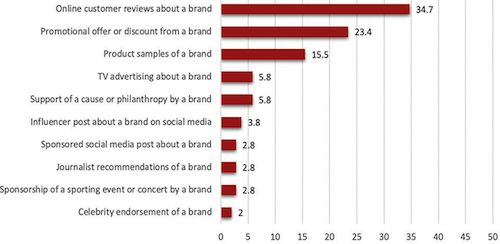More Americans next year will receive their news of the world from mobile phones than any other traditional or digital source, according to the latest Relevance Report released by the USC Annenberg Center for Public Relations.
The annual USC Center for PR report, which identifies emerging issues and trends by asking Americans which products, brands and technologies will be most relevant to them in the near future, found that more than half of Americans (56.1 percent) said they’ll get their news and information from mobile phones in 2020, compared to only 12 percent who cited television. Laptops (8.5 percent), tablets (5 percent) and desktop computers (5 percent) followed.
Only 4.7 percent of respondents said they plan to get their news from the radio next year.
 Which is the most likely to influence your purchase decisions in 2020? Which is the most likely to influence your purchase decisions in 2020? |
The USC Center report also found that online customer reviews remain the most trusted source when it comes to influencing consumers’ purchasing decisions. More than a third of Americans surveyed (34.7 percent) said they’re most likely to be influenced by customer reviews of brands. This was followed distantly by promotional offers or discounts (23.4 percent), product samples (15.5 percent), and TV advertising (5.8 percent).
For all the talk in recent years about the need for brands to take a public stance on social issues, those efforts don’t appear to hold much sway in convincing consumers to buy something (only 5.8 percent). And only 3.8 believe posts from influencers influence their purchasing decisions, followed by only 2.8 percent who said sponsored social media posts would influence those decisions.
Journalist recommendations, event sponsorships and celebrity endorsements were seen as the least likely to sway consumers’ purchasing habits, at 2.8 percent, 2.8 percent and 2 percent, respectively.
Facebook continues to dominate as America’s preferred social media platform. Nearly half of respondents (43.4 percent) reported that Facebook will be the channel where they’ll be most likely to post content next year. Instagram came in at a distant second (19.7 percent), followed by Twitter (13.8 percent), YouTube (6 percent), Snapchat (5.5 percent), Reddit (5 percent) and WhatsApp (2.1 percent).
LinkedIn, Pinterest, and TikTok bottomed out the list, at 2.1 percent, 1.2 percent and .9 percent, respectively.
CNN and Fox run neck-and-neck when it comes to the tradition media source Americans believe will influence their opinions the most in 2020 (at 20.2 percent and 19.8 percent, respectively). NPR (12.2 percent), ABC News (10.4 percent) and The New York Times (8.8 percent) followed, beating out CBS News (6.2 percent), The Washington Post (5.3 percent) and The Wall Street Journal (3.9 percent). Among the media outlets listed in the survey, Time magazine ranked last (3.2 percent).
Americans similarly cited Buzzfeed (18.3 percent), HuffPost (16.2 percent), Twitter News (15.5 percent) and Vice (9 percent) as their most-trusted digital news sources, followed by Politico (9 percent), Vox (6.7 percent) and satire site The Onion (5.1 percent) followed.
Americans believe Wireless 5G will prove to be the emerging technology to have the most impact (28.3 percent) on their daily lives. This was followed by wearables (16.4 percent), voice assistants (12.9 percent) and artificial intelligence (10.3 percent). Less than 10 percent of Americans think automated vehicles (7.2 percent), 3-D printing (6.3 percent) or delivery drones (5.6 percent) will impact them in 2020. Virtual reality (4.8 percent), DNA testing (4.3 percent) and in-home robots (3.8 percent) bottomed out the list as the technologies Americans feel are least likely to make an impact on their daily lives.
When it comes to whose advice Americans are most likely to follow, nearly half of respondents cited their family members (48.7 percent), followed at a very distant second by journalists (8.8 percent). Relatively few Americans said they’re likely to get advice from clergy members (7.3 percent) or online influencers (6.5 percent). Politicians (2.9 percent), athletes (2.2 percent) and experts (1.2 percent) bottomed out the list.
The USC Center for PR partnered with the Institute for Public Relations and Interpublic’s Golin unit in publishing the 2020 edition of its “Relevance Report.” 1,000 Americans were surveyed in August. The survey was conducted via online survey company Survey Monkey.


 Abandon traditional content plans focused on a linear buyer progression and instead embrace a consumer journey where no matter which direction they travel, they get what they need, stressed marketing pro Ashley Faus during O'Dwyer's webinar Apr. 2.
Abandon traditional content plans focused on a linear buyer progression and instead embrace a consumer journey where no matter which direction they travel, they get what they need, stressed marketing pro Ashley Faus during O'Dwyer's webinar Apr. 2. Freelance marketers and the companies that hire them are both satisfied with the current work arrangements they have and anticipate the volume of freelance opportunities to increase in the future, according to new data on the growing freelance marketing economy.
Freelance marketers and the companies that hire them are both satisfied with the current work arrangements they have and anticipate the volume of freelance opportunities to increase in the future, according to new data on the growing freelance marketing economy. Home Depot's new attempt to occupy two market positions at once will require careful positioning strategy and execution to make it work.
Home Depot's new attempt to occupy two market positions at once will require careful positioning strategy and execution to make it work. Verizon snags Peloton Interactive chief marketing officer Leslie Berland as its new CMO, effective Jan. 9. Berland succeeds Diego Scotti, who left Verizon earlier this year.
Verizon snags Peloton Interactive chief marketing officer Leslie Berland as its new CMO, effective Jan. 9. Berland succeeds Diego Scotti, who left Verizon earlier this year.  Norm de Greve, who has been CMO at CVS Health since 2015, is taking the top marketing job at General Motors, effective July 31.
Norm de Greve, who has been CMO at CVS Health since 2015, is taking the top marketing job at General Motors, effective July 31.


 Have a comment? Send it to
Have a comment? Send it to 
No comments have been submitted for this story yet.